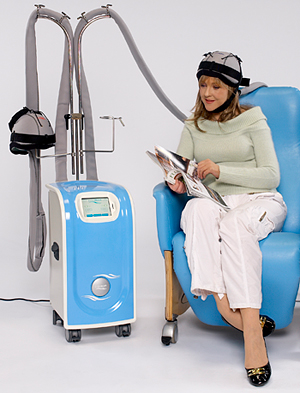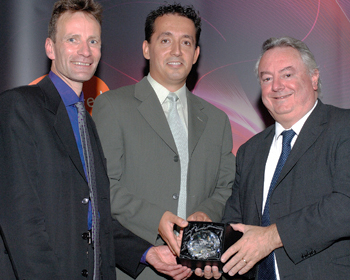Combating hair loss in cancer treatment
Fri, 19 Oct 2012 13:46:00 BST
Biochemists’ KTP with Paxman Coolers to improve scalp cooling systems
 HAIR loss during chemotherapy is one of the most traumatic side-effects of cancer treatment. Now a Huddersfield company, already the world leader for devices designed to combat the problem, has developed a major research collaboration with its neighbouring university, the University of Huddersfield.
HAIR loss during chemotherapy is one of the most traumatic side-effects of cancer treatment. Now a Huddersfield company, already the world leader for devices designed to combat the problem, has developed a major research collaboration with its neighbouring university, the University of Huddersfield.
The collaboration will lead to deeper understanding of the scientific issues and to further improvements in globally-marketed scalp cooling caps that have widely proved to be an effective solution.
The firm is Paxman Coolers, whose founder and Chairman Glenn Paxman had first-hand experience of the hair-loss issue when his wife underwent chemotherapy. It was already known that scalp cooling could alleviate the problem, but the basic cooling cap available at the time failed to work in her case, leading to considerable distress.
Mr Paxman’s grandfather had invented the beer cooler in the 1950s and founded a company to manufacture it, so Glenn decided to harness his family’s expertise in this field of technology in order to develop a new, improved scalp cooler. Paxman Coolers Ltd was formed in 1997 and is now acknowledged to be the leading manufacturer and supplier of scalp cooling equipment.
 The success of the treatment
The success of the treatment
The Paxman scalp cooling device (pictured right) consists of a small compact refrigeration unit containing a special coolant which is circulated at low temperature to specially-designed cooling caps. The caps are soft, flexible and provide a close fit around the patient’s head. The success of the treatment is affected by the degree of control in maintaining the scalp at a constant temperature, which the Paxman system guarantees, in contrast to previous versions of scalp cooling.
So far, over 1,500 systems have been sold in 32 countries with some 700 in use in the UK. But the firm is determined to increase the use and acceptance of the Paxman cooling cap and to develop greater understanding of the science behind the process.
For example, why does the effectiveness of scalp cooling vary in accordance with the drugs being used to treat the patient?
“With certain drugs the response to cooling is really good and efficient – with success rates of up to 95 per cent,” says the University of Huddersfield cancer biologist Dr Nik Georgopoulos.
“But when other drugs are prescribed, depending on the type of cancer and the treatment recommended, cooling does not work so well,” he added.
Pictured (left to right) receiving their award at the recent Research Festival are: Dr Andrew Collett and Dr Nik Georgopoulos with the University's Vice-Chancellor Professor Bob Cryan
 So, in conjunction with his colleague Dr Andrew Collett and researcher Alex Lees (pictured below) – a recent University of Huddersfield graduate – Dr Georgopoulos is working closely with Paxman in order to learn as much as possible about the science of scalp cooling. The collaboration forms a Knowledge Transfer Partnership (KTP), which is partially funded by the Technology Strategy Board and the Department of Health.
So, in conjunction with his colleague Dr Andrew Collett and researcher Alex Lees (pictured below) – a recent University of Huddersfield graduate – Dr Georgopoulos is working closely with Paxman in order to learn as much as possible about the science of scalp cooling. The collaboration forms a Knowledge Transfer Partnership (KTP), which is partially funded by the Technology Strategy Board and the Department of Health.
Dr Georgopoulos said: “Our job with this KTP is to increase publicity for scalp cooling and also produce relevant biological data – good evidence that will show nurses, patients and doctors that cooling works and how it works.”
 Before the KTP was awarded, Paxman had already worked with University of Huddersfield experts on a major project to improve the design of cooling caps. In addition to the KTP award, biologists Dr Georgopoulos and Dr Collett, as well as product design specialists Dr Ertu Unver and Chris Howard are also involved in a project funded by a Technology Strategy Board Smart grant of £500,000 awarded to Paxman Coolers, which allows Paxman to utilise biological and design expertise to develop an improved cooling cap prototype.
Before the KTP was awarded, Paxman had already worked with University of Huddersfield experts on a major project to improve the design of cooling caps. In addition to the KTP award, biologists Dr Georgopoulos and Dr Collett, as well as product design specialists Dr Ertu Unver and Chris Howard are also involved in a project funded by a Technology Strategy Board Smart grant of £500,000 awarded to Paxman Coolers, which allows Paxman to utilise biological and design expertise to develop an improved cooling cap prototype.
Now Paxman hope that the KTP – which began in September – will play a key role in its mission to make scalp cooling a standard treatment for cancer patients.
- For further information, visit http://www.paxman-coolers.co.uk/ or http://www.coolheadwarmheart.co.uk/ or follow @CHWHcampaign and @Paxmancoldcap on Twitter.







